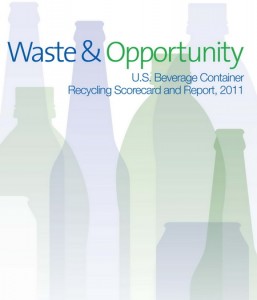A new report assessing corporate progress on recycling released by shareholder advocacy group As You Sow revealed that several major U.S. beverage brands are ready to support new laws that make producers financially responsible for collection and recycling of post-consumer beverage packaging.
Nestlé Waters North America that has recently got an award for its eco-shape bottle, received the highest ranking, followed closely by PepsiCo, The Coca-Cola Company, and Red Bull. All four received a letter grade of B-. The new report, ‘Waste & Opportunity: U.S. Beverage Container Recycling Scorecard and Report,’ is As You Sow’s third review of the beverage industry since 2006.
New efforts by several companies to promote Extended Producer Responsibility (EPR) mandates to reverse lagging U.S. bottle and can recycling rates are discussed in the report.
According to it, of the 224 billion beverage containers sold annually in the U.S. only 29% by weight are recycled; the rest are landfilled or incinerated, resulting in a huge waste of natural resources. In Europe and Canada, where EPR laws are in place, far higher levels of containers are recovered.
The report is based on original research and scores companies on key performance areas in packaging. Grades were based on information submitted by companies who responded to the survey. Those who did not respond were scored based on publicly available information.
“Several leading beverage companies continue to make steady incremental progress on source reduction but have not demonstrated strong commitments to using recycled content—a significant driver in reducing the environmental impact of packaging,” said Amy Galland, Ph.D., As You Sow’s Research Director and author of the study.
Among the main findings of the report is the new position of the The Coca-Cola Company to container deposit system. Historically opposed to it, Coca-Cola is now ‘neutral’ on a ‘voluntary’ system of deposits administered by associated industries, though still opposite to consumer deposits administered by an independent third party.
Several survey respondents said that in developing a recycling program, they are most likely to support programs that set recycling fees paid by producers or importers that are included in the price of the product and administered by industry.
‘Waste & Opportunity 2011” and the Executive Summary can be downloaded here.
